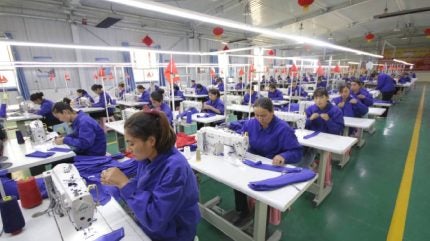
The report, titled ‘China Country Report: Macroeconomic and Sustainability Analysis,‘ uses data from the Higg Facility Environmental Module (Higg FEM), a tool designed by Cascale to evaluate the environmental impact of manufacturing facilities.
The Higg FEM assesses factory performance in areas such as energy use, emissions, water, wastewater, and chemical management.

Discover B2B Marketing That Performs
Combine business intelligence and editorial excellence to reach engaged professionals across 36 leading media platforms.
Higg Index senior vice president Jeremy Lardeau said: “Cascale’s Higg FEM data is a powerful lens into where the industry is headed. China remains a critical player in global textile and apparel manufacturing and has demonstrated it can lead the way in innovation, new technology adoption and scaling.
“The opportunity now is to leverage sustainability and innovation not only to meet regulatory and buyer demands but to build long-term competitiveness in a rapidly changing market.”
Findings indicate that despite facing challenges to decarbonise and enhance working conditions, China is well positioned to become a centre for low-carbon, circular, and technologically advanced production.
Key insights from the China textile sustainability report
– Green Growth and Renewable Energy: China’s investment in renewable energy sources like solar, wind, and hydro power enables factories to utilise clean electricity. Progress is evident among facilities that have adopted energy-efficient practices and renewable solutions, potentially offering “low-carbon apparel” as a new market edge.

US Tariffs are shifting - will you react or anticipate?
Don’t let policy changes catch you off guard. Stay proactive with real-time data and expert analysis.
By GlobalData– Circular Economy and Recycling: Aligned with national goals to establish a textile recycling system by 2025, Chinese companies are increasingly adopting water recycling and waste reduction practices. They are also developing recycling solutions that could significantly cut down on the nation’s annual textile waste.
– Technological Innovation and Digitalisation: The Higg FEM reflects gains in operational efficiency due to the adoption of automation, artificial intelligence, and smart factory models. These technologies pave the way for increased productivity with less waste.
– Market Diversification and Domestic Upgrading: With Western demand levelling off, China is turning towards emerging markets and strengthening domestic brands. Facilities that perform well on sustainability metrics are poised to attract new business opportunities.
– Policy Support and Global Collaboration: Chinese manufacturers enjoy policy incentives for adopting green technologies and are engaging more with international sustainability frameworks. The transparency provided by tools like the Higg FEM is essential for aligning with these global initiatives.
While the Higg FEM does not measure social responsibility, Cascale’s broader report acknowledges improvements in wages and safety standards for China’s estimated 7.8m textile and apparel workers.
However, issues such as long work hours, limited worker representation, and compliance persist.
Cascale’s analysis suggests that embracing renewable energy, recycling initiatives, and digital transformation could not only mitigate environmental impacts but also reinforce China’s dominant position in the textile and apparel industry.
Cascale interim CEO Harsh Saini said: “Cascale and its members are committed to combat climate change and support decent work. Our new China country report reveals that pursuing these objectives in tandem – pairing action on decarbonisation with that on working conditions – is critical for the industry to sustain competitiveness and meet growing expectations.”





